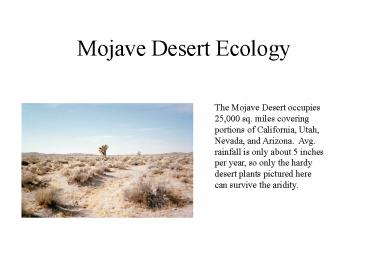Mojave Desert Ecology PowerPoint PPT Presentation
1 / 13
Title: Mojave Desert Ecology
1
Mojave Desert Ecology
The Mojave Desert occupies 25,000 sq. miles
covering portions of California, Utah, Nevada,
and Arizona. Avg. rainfall is only about 5
inches per year, so only the hardy desert plants
pictured here can survive the aridity.
2
Joshua Trees
The Joshua Tree is the most popular symbol of the
Mojave Desert. The tree has a weird shape, and
the branches are made of pith, not wood.
3
Mountain Erosion
Mountain erosion in the Mojave Desert is
shown in the next few slides. Processes of
weathering wind, ice, rainfall, all contribute
to turning the mountain rocks into boulders and
small sediments.
4
Mountain Erosion (2)
In this view we can see talus, that is, rocky
sediment draped like an apron at the bottom of
these mountains. Erosion wore away on
the mountain rocks and in time were pulled down
to the mountains base by gravity, creating the
pile of rubble seen here.
5
Mountain Erosion (3)
In this view, we can see deep gulleys carved in
the mountain walls by periods of heavy
rainfall. We can also see alluvial fans, that
is, fan-shaped piles of sediment (sand) which
were washed down there by rainfall.
6
Mountain Erosion (4)
Here are pictured pinnacles in the mountain
produced by differential weathering. This occurs
when weak fractures in the rock are eroded faster
than the surrounding rock.
7
Cinder Cones
This field in the Mojave Desert shows evidence of
several ancient cinder cone volcanoes produced
millions of years ago by pyroclastic debris.
Notice the steep circular shape of these
volcanoes and the dimples or craters at the top
of some of them.
8
Dry Lake
This is Ivanpah Dry Lake near Las Vegas. Notice
that the lake bottom is exposed with no water in
it. Water only fills in here during heavy rains.
Most desert lakes and streams are ephemeral and
only have water in them during periods of heavy
rainfall.
9
Rock Red Canyon Entrance
Red Rock Canyon is located about 10 miles west
of Las Vegas and has a 13 mile road you can drive
around.
10
Aztec Sandstone
The sheer escarpment of the Aztec Sandstone in
Red Rock Canyon is pictured here. During the
late Mesozoic Era millions of years ago, the
grey limestone was thrust up over the existing
red sandstone, thus protecting the
weaker sandstone from erosion.
11
Calico Hills
The Calico Hills in Red Rock Canyon are more
rounded because here the sandstone is not covered
by the grey limestone, thus subjecting it to more
erosion.
12
Calico Hills Closeup
13
Desert Dry Wash
This dry wash, or arroyo, in Red Rock Canyon is a
typical desert dry wash. No water is in the
wash unless it is raining. We can see evidence
of water in the greener plants and pebble and
sand sediments.

